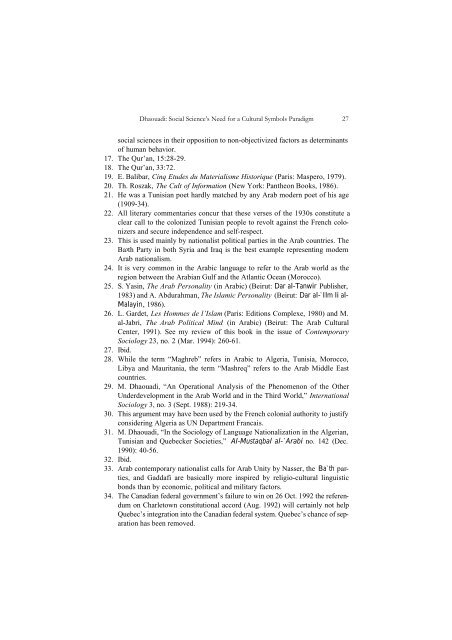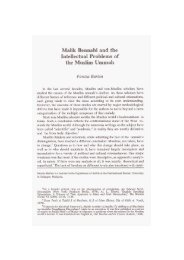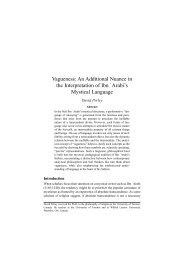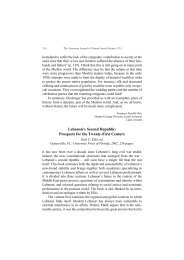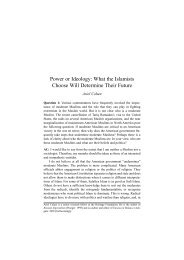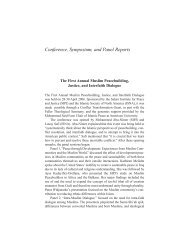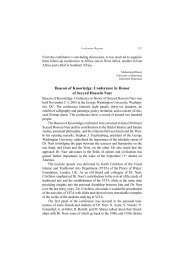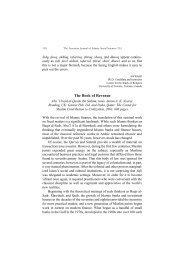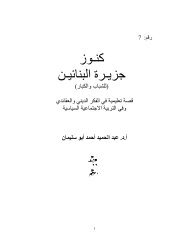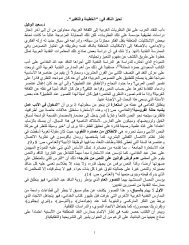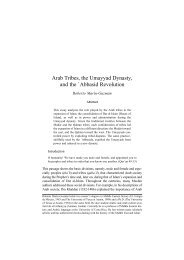Social Science's Need for a Cultural Symbols ... - Epistemology
Social Science's Need for a Cultural Symbols ... - Epistemology
Social Science's Need for a Cultural Symbols ... - Epistemology
You also want an ePaper? Increase the reach of your titles
YUMPU automatically turns print PDFs into web optimized ePapers that Google loves.
Dhaouadi: <strong>Social</strong> Science’s <strong>Need</strong> <strong>for</strong> a <strong>Cultural</strong> <strong>Symbols</strong> Paradigm 27<br />
social sciences in their opposition to non-objectivized factors as determinants<br />
of human behavior.<br />
17. The Qur’an, 15:28-29.<br />
18. The Qur’an, 33:72.<br />
19. E. Balibar, Cinq Etudes du Materialisme Historique (Paris: Maspero, 1979).<br />
20. Th. Roszak, The Cult of In<strong>for</strong>mation (New York: Pantheon Books, 1986).<br />
21. He was a Tunisian poet hardly matched by any Arab modern poet of his age<br />
(1909-34).<br />
22. All literary commentaries concur that these verses of the 1930s constitute a<br />
clear call to the colonized Tunisian people to revolt against the French colonizers<br />
and secure independence and self-respect.<br />
23. This is used mainly by nationalist political parties in the Arab countries. The<br />
Ba>th Party in both Syria and Iraq is the best example representing modern<br />
Arab nationalism.<br />
24. It is very common in the Arabic language to refer to the Arab world as the<br />
region between the Arabian Gulf and the Atlantic Ocean (Morocco).<br />
25. S. Yasin, The Arab Personality (in Arabic) (Beirut: Dar al-Tanwir Publisher,<br />
1983) and A. Abdurahman, The Islamic Personality (Beirut: Dar al-`Ilm li al-<br />
Malayin, 1986).<br />
26. L. Gardet, Les Hommes de l’Islam (Paris: Editions Complexe, 1980) and M.<br />
al-Jabri, The Arab Political Mind (in Arabic) (Beirut: The Arab <strong>Cultural</strong><br />
Center, 1991). See my review of this book in the issue of Contemporary<br />
Sociology 23, no. 2 (Mar. 1994): 260-61.<br />
27. Ibid.<br />
28. While the term “Maghreb” refers in Arabic to Algeria, Tunisia, Morocco,<br />
Libya and Mauritania, the term “Mashreq” refers to the Arab Middle East<br />
countries.<br />
29. M. Dhaouadi, “An Operational Analysis of the Phenomenon of the Other<br />
Underdevelopment in the Arab World and in the Third World,” International<br />
Sociology 3, no. 3 (Sept. 1988): 219-34.<br />
30. This argument may have been used by the French colonial authority to justify<br />
considering Algeria as UN Department Francais.<br />
31. M. Dhaouadi, “In the Sociology of Language Nationalization in the Algerian,<br />
Tunisian and Quebecker Societies,” Al-Mustaqbal al-`Arabi no. 142 (Dec.<br />
1990): 40-56.<br />
32. Ibid.<br />
33. Arab contemporary nationalist calls <strong>for</strong> Arab Unity by Nasser, the Ba`th parties,<br />
and Gaddafi are basically more inspired by religio-cultural linguistic<br />
bonds than by economic, political and military factors.<br />
34. The Canadian federal government’s failure to win on 26 Oct. 1992 the referendum<br />
on Charletown constitutional accord (Aug. 1992) will certainly not help<br />
Quebec’s integration into the Canadian federal system. Quebec’s chance of separation<br />
has been removed.


